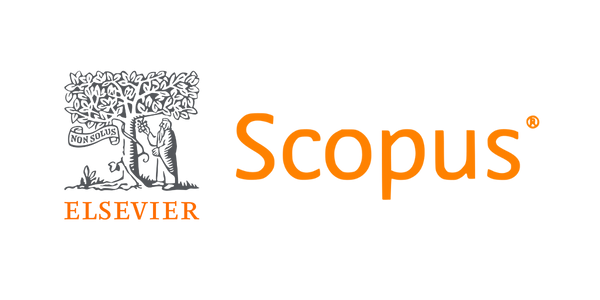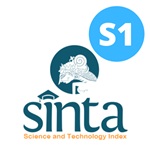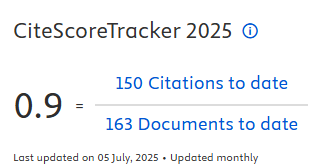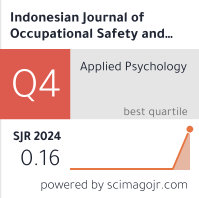Correlation of Nutritional Status and Subjective Fatigue with the Productivity of Labourers
Downloads
Introduction: The scallions sorting and weighing center are an informal sector business engaged in fulfilling the supply of scallions for the wholesale market in Sidoarjo. The labourers at the sorting and weighing scallions have varying nutritional status. The labourers with the normal nutritional status of produce more of processed scallions, whereas those who have poor nutritional status usually the produce fewer number of processed scallions. Work fatigue in the labourers also determines their productivity. Therefore, this study aims to analyze the correlation between individual characteristics, nutritional status, subjective fatigue and the productivity of the labourers in the sorting and weighing scallions. Methods: Based on the objectives of this study, this research is an observational and correlational type of research. The samples of this study were 28 labourers. The variables of this study are individual characteristics, nutritional status, subjective fatigue, and work productivity. Results: The magnitude of the value of the contingency coefficient test and the Spearman correlation with the value α = 1% which showed the results of relationship between years of service with productivity, nutritional status with productivity and also subjective fatigue with productivity. The sig value of correlation coefficient is less than 0.01. Conclusion: There is a relationship between individual characteristics, nutritional status, subjective fatigue with work productivity in the sorting and weighing scallions.
Keywords: education, fatigue, nutritional status, productivity, time of services
Amalia, I. and Widajati, N. (2019) ‘Analisa Kelelahan Kerja Secara Obyektif Berdasarkan Reaction Timer Pada Tenaga Kerja Unit Pengerolan Besi PT. X', Journal Of Health Science and Prevention, 3(34), pp. 16–24.
Aprilyanti, S. (2017) ‘Pengaruh Usia Dan Masa Kerja Terhadap Produktivitas Kerja(Studi Kasus PT Oasis Water International Cabang Palembang)', Jurnal Sistem dan Manajemen, 2(1), pp. 66–84. doi: 10.13140/RG.2.2.15858.61129.
Astuti, P. (2017) ‘Hubungan Asupan Energi, Asupan Protein Dan Status Gizi Dengan Produktivitas Kerja Pada Tenaga Kerja Wanita Bagian Finishing 3 PT Hanil Indonesia Nepen Teras Boyolali', Jurnal Ilmu Gizi Universitas Muhammadiyah Surakarta, 2(1), pp. 28–40.
Elia, K. P., Josephus, J. and Tucunan, A. T. (2016) ‘Hubungan Antara Kelelahan Kerja Dan Masa Kerja Dengan Produktivitas Kerja Pada Tenaga Kerja Bongkar Muat Di Pelabuhan Bitung Tahun 2015', Pharmacon : Jurnal Ilmiah Farmasi – UNSRAT, 5(2), pp. 107–113.
Farikha, R. R. P. and Ardyanto, D. (2018) ‘Relationship of Nutrition Status, Individual Characteristics with Productivity of Sorting and Packing Workers', The Indonesian Journal of Occupational Safety and Health, 5(1), pp. 42–68.
Gaol, J. L. (2014) A To Z Human Capital Management of Human Resources. Jakarta: Gramedia Widiasarana Indonesia.
Government of the Republic of Indonesia (2009) Constitution of the Republic of Indonesia No.36 of 2009 concerning Health. Indonesia.
Hasibuan, M. S. (2013) Manajemen Sumber Daya Manusia. Jakarta: Bumi Aksara.
Karima, A. N. A., Idayanti and Umar, F. (2017) ‘Pengaruh Masa Kerja, Pelatihan dan Motivasi Terhadap Produktivitas Kerja Karyawan Pada PT. Bank Sulselbar Cabang Utama Makasar', Jurnal Ekonomi dan Bisnis Unhas, 3(1), pp. 49–64.
Laminia, D. and Muniroh, L. (2018) ‘Relationship Of Motivation And Work Period With Workers Productivity At Home Industry', The Indonesian Journal of Occupational Safety and Health, 7(2), pp. 240–248.
Manik, S. (2018) ‘Factors Affecting Employee Productivity at Bank Danamon Savings and Loans', Maqdis : Jurnal Kajian Ekonomi Islam, 3(1), pp. 113–142.
Mardalena, I. (2017) Dasar – Dasar Ilmu Gizi dalam Keperawatan. Yogyakarta: Pustaka Baru Press.
Ministry of Health (2018) Nutrition Status Monitoring Handbook for the Year 2017. Jakarta: Direktorat Gizi Masyarakat Kementerian Kesehatan.
Pasaribu, F. (2018) Effect of Employee Characteristics on Work Productivity.
Putra, I. M. Y. A. . and Wardana, G. (2019) ‘The Effects of Work Experience, Educational Level and Technology on the Productivity of Wood Carving Workers', E-Journal of Development Economics Universitas Udayana, 8(3), pp. 669–697.
Putri, H. R. (2016) ‘The Effects Of The Education, Work Experience, And Sex On The Productivity At Work Among Workers At The Production Section Of CV. Karunia Abadi Wonosobo', Jurnal Pendidikan Dan Ekonomi, 5(4), pp. 292–300.
Rahmawati, D. (2013) ‘Pengaruh Motivasi Terhadap Produktivitas Kerja Karyawan PR Fajar Berlian Tulungagung', Journal of Universitas Tulungagung Bonorowo, 1(1), pp. 1–16.
Ramadhani, R. (2018) ‘Pengaruh Pendidikan Dan Kemampuan Kerja Terhadap Produktivitas Kerja Pegawai Di Kantor Kecamatan Babulu Kabupaten Penajam Paser Utara', E – Jurnal Ilmu Pemerintahan, 6(4), pp. 2069–2080.
Ratna and Fauziah (2018) ‘Upah, Jenis Kelamin Dan Usia Terhadap Produktivitas Kerja Karyawan Pada Industri Kecil Di Kabupaten Aceh Utara', Jurnal Ekonomi Pertanian Unimal, 1(1), pp. 17–22.
Ratnawati, I. (2011) Pemenuhan Kecukupan Gizi Bagi Pekerja. Jakarta: Direktorat Jendral Kesehatan Masyarakat, Kementerian Kesehatan.
Risaldi, Wirapuspita, R. and Iriyani, K. (2017) ‘Hubungan Status Gizi Dengan Tingkat Produktivitas Pekerja Wanita Di PT. Idec Abadi Wood Industries Tarakan', Journal of Health, 5(1), pp. 52–59.
Sedarmayanti (2009) Sumber Daya Manusia dan Produktivitas Kerja. Bandung: Mandar Maju.
Sedarmayanti (2011) Work Ethics and Productivity. Bandung: Mandar Maju.
Soedirman and Suma'mur, P. . (2014) Kesehatan Kerja Dalam Perspektif Hiperkes Dan Keselamatan Kerja. Jakarta: Erlangga.
Suma'mur, P. . (2009) Higiene Perusahaan Dan Keselamatam Kerja. Jakarta: Agung Seto.
Suma'mur, P. . (2013) Higiene Perusahaan Dan Kesehatan Kerja (Hiperkes). Jakarta: Agung Seto.
Suryaningtyas, Y. and Widajati, N. (2017) ‘Iklim Kerja Dan Status Gizi Dengan Kelelahan Kerja Pada Pekerja Di Ballast Tank Bagian Reparasi Kapal PT.X Surabaya', Jurnal Manajemen Kesehatan Yayasan RS. Dr. Soetomo, 3(1), pp. 99–114.
Tarwaka (2011) Ergonomi Industri, Dasar-Dasar Pengetahuan Ergonomi dan Aplikasi Di Tempat Kerja. Surakarta: Harapan Press Surakarta.
Tarwaka (2014) Ergonomi Indutri: Dasar-Dasar Pengetahuan Ergonomi dan Aplikasi di Tempat Kerja. Surakarta: Harapan Press Surakarta.
Utami, S. R. (2012) ‘Status Gizi, Kebugaran Jasmani Dan Produktivitas Kerja Pada Tenaga Kerja Wanita', Journal of Public Health (Kesmas), 8(1), pp. 74–80.
Widiastuti, A. (2011) Analisa Kecerdasan Emosioal dan Komitmen Kerja Karyawan Hotel. Jakarta: Katolik Atmajaya Press.
Wignjosoebroto, S. (2003) Study Gerak Dan Waktu – Teknik Analisis Untuk Peningkatan Produktivitas Kerja. Surabaya: Guna Widya.
Yusida, H. et al. (2017) Kepedulian Aktif Untuk K3 Sektor Informal. Bajarbaru: Grafika Wangi Kalimantan.

In order to be accepted and published by The Indonesian Journal of Occupational Safety and Health, Author(s) who submit an article should complete all the review process. The copyright of received articles assigned to the The Indonesian Journal of Occupational Safety and Health and Department of Safety and Health, Universitas Airlangga as publishers of the journal. The intended copyright includes the rights to publish articles in various forms (including reprints).
The Editorial Team of The Indonesian Journal Of Occupational Safety and Health and Department of Safety and Health strive to ensure that no errors occur in the articles that have been published, both data errors and statements in the article.
Users of this website will be licensed to use materials from this website following the Creative Commons Attribution-NonCommercial-ShareAlike 4.0 International License. No fees charged. Please use the materials accordingly.
------------------------------------------------------------------------------------------------------------------------------------------------------------------------------------------
Attribution ” You must give appropriate credit, provide a link to the license, and indicate if changes were made. You may do so in any reasonable manner, but not in any way that suggests the licensor endorses you or your use.
NonCommercial ” You may not use the material for commercial purposes.
ShareAlike ” If you remix, transform, or build upon the material, you must distribute your contributions under the same license as the original.







 How to Submit Articles in OJS
How to Submit Articles in OJS

























